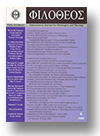|
|
|
1.
|
Philotheos:
Volume >
6
Федор Иванович Гиренок
Философия антропологии
view |
rights & permissions
| cited by
|
|
|
|
|
|
|
2.
|
Philotheos:
Volume >
6
Georg Scherer
Göttliche Trinität und menschliche Interpersonalität
view |
rights & permissions
| cited by
|
|
|
|
|
|
|
3.
|
Philotheos:
Volume >
6
Jörg Splett
Ich als Du. Philosophisches zu Person und Beziehung
view |
rights & permissions
| cited by
|
|
|
|
|
|
|
4.
|
Philotheos:
Volume >
6
Werner Theobald
Kultur, Religion und Moral:
Unzeitgemäße Betrachtungen zu einem zeitgemäßen Thema
view |
rights & permissions
| cited by
|
|
|
|
|
|
|
5.
|
Philotheos:
Volume >
6
Spyridoula Athanasopoulou-Kypriou
Beyond the Death of the Christian Novel: Literature as Theology
abstract |
view |
rights & permissions
| cited by
The aims of this paper are to qualify theologically Paul Fiddes’ claim that creative writing can be understood as a response to divine revelation and to construct a preliminary sketch of a theological framework in order to appreciate textuality and move from reading literary texts in the light of theology to considering them as theology, that is, as sacraments of communion with God. What follows is, thus, an inquiry into some of the theological presuppositions and criteria, which would enable a reader with a Christian perspective to consider any literary text theologically and read it as a kind of doxology.
|
|
|
|
|
|
|
6.
|
Philotheos:
Volume >
6
Валерий Дмитриевич Губин
Настроение как философская проблема
view |
rights & permissions
| cited by
|
|
|
|
|
|
|
7.
|
Philotheos:
Volume >
6
Markus Enders
Hans-Georg Gadamers hermeneutisches Verständnis der Wahrheit
view |
rights & permissions
| cited by
|
|
|
|
|
|
|
8.
|
Philotheos:
Volume >
6
Franz Weber, Tanja Pihlar
Über das Problem der Vorstellungsproduktion
view |
rights & permissions
| cited by
|
|
|
|
|
|
|
9.
|
Philotheos:
Volume >
6
Душан Крцуновић
Космогонски реализам Тимејеве „вјероватне приче“
abstract |
view |
rights & permissions
| cited by
This paper deals with the reasons for literal interpretation of Plato’s Timaeus (Aristoteles) against non-literal (Speusippus and Xenocrates). Its starting point is “dichotomy” between poetry (mythos) and philosophy that we can find, as well, in some commentary on the Genesis of Moses. But, instead dichotomy here is suggested some kind of iterative reading: the Timaeus of Plato is the poetry because God’s act of creation is the poetry, too. Artistic elements in this dialogue of Plato are in the function of his cosmogonical realism. It is supported with the thesis that the purpose of Plato’s Timaeus is not pedagogical or didactical, but soteriological; its aim is salvation of man.
|
|
|
|
|
|
|
10.
|
Philotheos:
Volume >
6
Christos Terezis, Zoé Antonopoulou-Trechli
Aspects de la philosophie du droit dans les Lois de Platon
view |
rights & permissions
| cited by
|
|
|
|
|
|
|
11.
|
Philotheos:
Volume >
6
Katelis Viglas
L’expérience de l’instant métaphysique:
La contribution de Plotin au problème «éternité et temps»
view |
rights & permissions
| cited by
|
|
|
|
|
|
|
12.
|
Philotheos:
Volume >
6
Валерий Яковлевич Саврей
Философия как «служанка теологии» в учении Климента Александрийского
view |
rights & permissions
| cited by
|
|
|
|
|
|
|
13.
|
Philotheos:
Volume >
6
Torstein Theodor Tollefsen
The Divine Energeia according to St. Gregory of Nyssa
view |
rights & permissions
| cited by
|
|
|
|
|
|
|
14.
|
Philotheos:
Volume >
6
Jean-Claude Larchet
La notion d’énergie(s) divine(s) dans l’œuvre de saint Jean Chrysostome
view |
rights & permissions
| cited by
|
|
|
|
|
|
|
15.
|
Philotheos:
Volume >
6
Boris B. Brajović
Ο Διάδοχος Φωτικής και η θεωρία περί της αρετής
abstract |
view |
rights & permissions
| cited by
In the virtue ethics of Diadochus Photice, the notion of self-rule (αὐτεξούσιον) is of paramount importance for the creative progress in one’s moral perfection. With the proper use of self-rule man can escape sin and turn himself to love. In addition, Diadochus also uses the notion of apatheia (ἀπάθεια) to indicate the way for a successful cleansing (κάθαρσις) of the soul, so that with this cleansing man can grasp the logoi (λόγοι) of beings. According to Diadochus Photice, virtue ethics must not be conceived in an anthropocentric way, but in a theocentric one, and so virtue does not depend only on the ethical achievements of man, but on divine grace and on the personal relation of man to God.
|
|
|
|
|
|
|
16.
|
Philotheos:
Volume >
6
Georgi Kapriev
Das intellektuelle Spiel und der Ernst der Geschichte:
Die „syllogistische Häresie“ des Photios und ihre Rezeption
view |
rights & permissions
| cited by
|
|
|
|
|
|
|
17.
|
Philotheos:
Volume >
6
Stavros Yangazoglou
Le salut comme divinisation de l’homme dans l’œuvre de St Grégoire Palamas
view |
rights & permissions
| cited by
|
|
|
|
|
|
|
18.
|
Philotheos:
Volume >
6
Werner Beierwaltes
Nicolaus Cusanus und Johannes Scottus Eriugena.Eine Retractatio
view |
rights & permissions
| cited by
|
|
|
|
|
|
|
19.
|
Philotheos:
Volume >
6
Olga Timofeevna Loyko
Der erste Historiker der russischen Philosophie im Kontext der Philosophie der Aufklärung
view |
rights & permissions
| cited by
|
|
|
|
|
|
|
20.
|
Philotheos:
Volume >
6
Виктор Троицкий
Фундаментальный вихрь в космологии о. Павла Флоренского
view |
rights & permissions
| cited by
|
|
|
|
